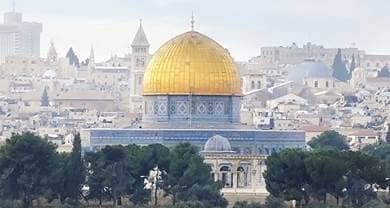- Trending:
- Olympics
- |
- Forgiveness
- |
- Resurrection
- |
- Joy
- |
- Afterlife
- |
- Trump

RELIGION LIBRARY
Islam
Rites and Ceremonies
In addition to the Five Pillars of Islam, a number of further religious practices regulate the lives of Muslims and bring meaning to the most important of life's transitions. The Quran contains prohibitions against the consumption of pork and wine. The prohibition on wine is typically interpreted to mean a general prohibition on alcohol. Smoking is similarly prohibited. Charging exorbitant interest on loans, or usury, is also prohibited in Islam. In Muhammad's day, interest rates were very high and tended to reduce the borrower to poverty. Gambling is forbidden, as it puts both gamblers and their families at risk.
 Male circumcision is an important religious duty in Islam and required by believers to perform on their newborn sons. There is no single explanation for the origins of this practice. It may have been adopted from the Jewish practice. Some say it reinforces human submission to God, while others view the practice as an important preventive measure against infection. It is also done to imitate Muhammad, who was circumcised. The controversial practice of female circumcision that is present in many parts of the world does not have any religious authority as does male circumcision. Defenders of the practice do not cite religious evidence that it is required in Islam.
Male circumcision is an important religious duty in Islam and required by believers to perform on their newborn sons. There is no single explanation for the origins of this practice. It may have been adopted from the Jewish practice. Some say it reinforces human submission to God, while others view the practice as an important preventive measure against infection. It is also done to imitate Muhammad, who was circumcised. The controversial practice of female circumcision that is present in many parts of the world does not have any religious authority as does male circumcision. Defenders of the practice do not cite religious evidence that it is required in Islam.
 Marriage is generally seen both as a civil contract in Islam as well as a religiously public and joyous ritual. Passages from the Quran are read, and there is usually a feast following the simple ceremony. Both men and women can initiate a divorce, and there is also a mechanism for annulling the marriage. However, divorce and annulment do not occur at the same frequency as they do in western societies.
Marriage is generally seen both as a civil contract in Islam as well as a religiously public and joyous ritual. Passages from the Quran are read, and there is usually a feast following the simple ceremony. Both men and women can initiate a divorce, and there is also a mechanism for annulling the marriage. However, divorce and annulment do not occur at the same frequency as they do in western societies.
Death is the most important event in a person's path to God, and the dying person is surrounded and supported by family and friends. Prayers and other passages from the Quran are read for the dying person, who repents of sins and, when possible, performs rituals of purification. At the time of death, those present at the deathbed whisper the shahadah in the dying person's ear. When possible, the dying person recites it as well. When death appears near, family members recite surah 36 from the Quran, which describes God's raising of the dead on the Day of Judgment.
 The body of the deceased person must be buried as promptly as possible, preferably by sunset on the day of the death, though Muslims handle this according to the laws of the land in which they live. The family of the deceased person is responsible for preparing the body for burial and for saying the funeral prayers, which are not typically said in the mosque. The body is buried in a plain white shroud. If the person went on pilgrimage to Mecca, then he or she is buried in the pilgrimage garments.
The body of the deceased person must be buried as promptly as possible, preferably by sunset on the day of the death, though Muslims handle this according to the laws of the land in which they live. The family of the deceased person is responsible for preparing the body for burial and for saying the funeral prayers, which are not typically said in the mosque. The body is buried in a plain white shroud. If the person went on pilgrimage to Mecca, then he or she is buried in the pilgrimage garments.  Male relatives climb into the grave to arrange the body on its right side in a hollow niche in the wall of the grave. They turn the deceased's face toward Mecca, supporting the cheek with a stone. The last person in the grave with the body again whispers the shahadah in the deceased's ear. Each member of the assembled party throws soil into the grave, and a member of the party recites a blessing that summarizes the key beliefs of Muslims. Many Shi'i Muslims also recite the names of the twelve imams. Graves are marked with simple stone markers, to emphasize the equality of all people in death. The deceased repose in an intermediary state called the barzakh until God resurrects the dead on the Day of Judgment.
Male relatives climb into the grave to arrange the body on its right side in a hollow niche in the wall of the grave. They turn the deceased's face toward Mecca, supporting the cheek with a stone. The last person in the grave with the body again whispers the shahadah in the deceased's ear. Each member of the assembled party throws soil into the grave, and a member of the party recites a blessing that summarizes the key beliefs of Muslims. Many Shi'i Muslims also recite the names of the twelve imams. Graves are marked with simple stone markers, to emphasize the equality of all people in death. The deceased repose in an intermediary state called the barzakh until God resurrects the dead on the Day of Judgment.
Study Questions:
1. How is Muslim behavior dictated by prohibitions?
2. Why is circumcision important for Muslim boys?
3. Describe the ceremonies that take place at death. Why is this the most important rite for Muslims?










